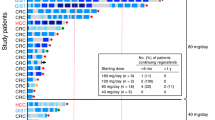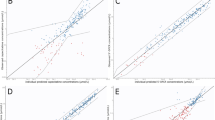Summary
The aim of the present study was to assess the pharmacokinetics (PK) of metronomic capecitabine and its metabolites in a population of refractory metastatic colorectal cancer (mCRC) patients. Thirty-four patients (M/F, 22/12) with a diagnosis of mCRC received capecitabine 800 mg p.o. twice a day and cyclophosphamide 50 mg/day p.o. Blood samples were collected at baseline, 15 min, 30 min, 1 h, 1.5 h, 2 h, 3 h and 5 h at day 1 after capecitabine administration. Plasma concentrations of capecitabine and its metabolites were measured by high performance liquid chromatography and the main PK parameters were calculated. Maximum plasma concentrations (Cmax) of capecitabine (11.51 ± 9.73 μg/ml) occurred at 0.5 h, whereas the Cmax of 5′-deoxy-5-fluorocytidine (5’-DFCR; 2.45 ± 2.93 μg/ml), 5′-deoxy-5-fluorouridine (5’-DFUR; 6.43 ± 8.2 μg/ml), and 5-fluorouracil (5-FU; 0.24 ± 0.16 μg/ml) were found at 1 h, 1.5 h and 1 h, respectively. Capecitabine, 5’-DFCR, 5’-DFUR and 5-FU AUCs at day 1 were 21.30 ± 10.78, 5.2 ± 4.6, 19.59 ± 3.83 and 0.66 ± 0.77 hxμg/ml, respectively. In conclusion, low doses of capecitabine were rapidly absorbed and extensively metabolized, achieving measurable plasma concentrations in a heavily pretreated population of patients.

Similar content being viewed by others
References
Reigner B, Blesch K, Weidekamm E (2001) Clinical pharmacokinetics of capecitabine. Clin Pharmacokinet 40(2):85–104
Miwa M, Ura M, Nishida M, Sawada N, Ishikawa T, Mori K, Shimma N, Umeda I, Ishitsuka H (1998) Design of a novel oral fluoropyrimidine carbamate, capecitabine, which generates 5-fluorouracil selectively in tumours by enzymes concentrated in human liver and cancer tissue. Eur J Cancer 34(8):1274–1281
Tabata T, Katoh M, Tokudome S, Hosakawa M, Chiba K, Nakajima M, Yokoi T (2004) Bioactivation of capecitabine in human liver: involvement of the cytosolic enzyme on 5′-deoxy-5-fluorocytidine formation. Drug Metab Dispos 32(7):762–767
Mercier C, Dupuis C, Blesius A, Fanciullino R, Yang CG, Padovani L, Giacometti S, Frances N, Iliadis A, Duffaud F, Ciccolini J (2009) Early severe toxicities after capecitabine intake: possible implication of a cytidine deaminase extensive metabolizer profile. Cancer Chemother Pharmacol 63(6):1177–1180
Camiener GW, Smith CG (1965) Studies of the enzymatic deamination of cytosine arabinoside. I Enzyme distribution and species specificity. Biochem Pharmacol 14(10):1405–1416
Schuller J, Cassidy J, Dumont E, Roos B, Durston S, Banken L, Utoh M, Mori K, Weidekamm E, Reigner B (2000) Preferential activation of capecitabine in tumor following oral administration to colorectal cancer patients. Cancer Chemother Pharmacol 45(4):291–297
Malet-Martino M, Jolimaitre P, Martino R (2002) The prodrugs of 5-fluorouracil. Curr Med Chem Anticancer Agents 2(2):267–310
Bocci G, Kerbel RS (2016) Pharmacokinetics of metronomic chemotherapy: a neglected but crucial aspect. Nat Rev Clin Oncol 13(11):659–673
Kerbel RS, Kamen BA (2004) The anti-angiogenic basis of metronomic chemotherapy. Nat Rev Cancer 4(6):423–436
Andre N, Carre M, Pasquier E (2014) Metronomics: towards personalized chemotherapy? Nat Rev Clin Oncol 11(7):413–431
Penel N, Adenis A, Bocci G (2012) Cyclophosphamide-based metronomic chemotherapy: after 10 years of experience, where do we stand and where are we going? Crit Rev Oncol Hematol 82(1):40–50
Andre N, Padovani L, Verschuur A (2010) Metronomic chemotherapy: back to the future! Drug News Perspect 23(2):143–151
Woo IS, Jung YH (2017) Metronomic chemotherapy in metastatic colorectal cancer. Cancer Lett 400:319–324
Marmorino F, Cremolini C, Loupakis F, Salvatore L, Schirripa M, Antoniotti C, Desidero TD, Canu B, Orlandi P, Fioravanti A, Masi G, Bocci G, Falcone A (2013) Metronomic capecitabine (cape) and cyclophosphamide (CTX) for refractory metastatic colorectal cancer (mCRC): Results of a phase II trial. J Clin Oncol 31(15_suppl):e14577–e14577
Dhananjeyan MR, Liu J, Bykowski C, Trendel JA, Sarver JG, Ando H, Erhardt PW (2007) Rapid and simultaneous determination of capecitabine and its metabolites in mouse plasma, mouse serum, and in rabbit bile by high-performance liquid chromatography. J Chromatogr A 1138(1–2):101–108
Garg MB, Sevester JC, Sakoff JA, Ackland SP (2002) Simple liquid chromatographic method for the determination of uracil and dihydrouracil plasma levels: a potential pretreatment predictor of 5-fluorouracil toxicity. J Chromatogr B Anal Technol Biomed Life Sci 774(2):223–230
Simkens LH, van Tinteren H, May A, ten Tije AJ, Creemers GJ, Loosveld OJ, de Jongh FE, Erdkamp FL, Erjavec Z, van der Torren AM, Tol J, Braun HJ, Nieboer P, van der Hoeven JJ, Haasjes JG, Jansen RL, Wals J, Cats A, Derleyn VA, Honkoop AH, Mol L, Punt CJ, Koopman M (2015) Maintenance treatment with capecitabine and bevacizumab in metastatic colorectal cancer (CAIRO3): a phase 3 randomised controlled trial of the Dutch colorectal cancer group. Lancet 385(9980):1843–1852
Chaigneau L, Royer B, Montange D, Nguyen T, Maurina T, Villanueva C, Demarchi M, Borg C, Fagnoni-Legat C, Kantelip JP, Pivot X (2008) Influence of capecitabine absorption on its metabolites pharmacokinetics: a bioequivalence study. Ann Oncol 19(11):1980–1981
Milano G, Ferrero JM, Francois E (2004) Comparative pharmacology of oral fluoropyrimidines: a focus on pharmacokinetics, pharmacodynamics and pharmacomodulation. Br J Cancer 91(4):613–617
Urien S, Rezai K, Lokiec F (2005) Pharmacokinetic modelling of 5-FU production from capecitabine--a population study in 40 adult patients with metastatic cancer. J Pharmacokinet Pharmacodyn 32(5–6):817–833
Vainchtein LD, Rosing H, Schellens JH, Beijnen JH (2010) A new, validated HPLC-MS/MS method for the simultaneous determination of the anti-cancer agent capecitabine and its metabolites: 5′-deoxy-5-fluorocytidine, 5′-deoxy-5-fluorouridine, 5-fluorouracil and 5-fluorodihydrouracil, in human plasma. Biomed Chromatogr 24(4):374–386. https://doi.org/10.1002/bmc.1302
Reigner B, Verweij J, Dirix L, Cassidy J, Twelves C, Allman D, Weidekamm E, Roos B, Banken L, Utoh M, Osterwalder B (1998) Effect of food on the pharmacokinetics of capecitabine and its metabolites following oral administration in cancer patients. Clin Cancer Res 4(4):941–948
Steinbild S, Arends J, Medinger M, Haring B, Frost A, Drevs J, Unger C, Strecker R, Hennig J, Mross K (2007) Metronomic antiangiogenic therapy with capecitabine and celecoxib in advanced tumor patients--results of a phase II study. Onkologie 30(12):629–635. https://doi.org/10.1159/000110580
Lokich J (2004) Capecitabine: fixed daily dose and continuous (noncyclic) dosing schedule. Cancer Investig 22(5):713–717
Van Cutsem E, Hoff PM, Harper P, Bukowski RM, Cunningham D, Dufour P, Graeven U, Lokich J, Madajewicz S, Maroun JA, Marshall JL, Mitchell EP, Perez-Manga G, Rougier P, Schmiegel W, Schoelmerich J, Sobrero A, Schilsky RL (2004) Oral capecitabine vs intravenous 5-fluorouracil and leucovorin: integrated efficacy data and novel analyses from two large, randomised, phase III trials. Br J Cancer 90(6):1190–1197
Allegrini G, Di Desidero T, Barletta MT, Fioravanti A, Orlandi P, Canu B, Chericoni S, Loupakis F, Di Paolo A, Masi G, Fontana A, Lucchesi S, Arrighi G, Giusiani M, Ciarlo A, Brandi G, Danesi R, Kerbel RS, Falcone A, Bocci G (2012) Clinical, pharmacokinetic and pharmacodynamic evaluations of metronomic UFT and cyclophosphamide plus celecoxib in patients with advanced refractory gastrointestinal cancers. Angiogenesis 15(2):275–286
Ciccolini J, Mercier C, Evrard A, Dahan L, Boyer JC, Duffaud F, Richard K, Blanquicett C, Milano G, Blesius A, Durand A, Seitz JF, Favre R, Lacarelle B (2006) A rapid and inexpensive method for anticipating severe toxicity to fluorouracil and fluorouracil-based chemotherapy. Ther Drug Monit 28(5):678–685
Di Paolo A, Del Re M, Arrigoni E, Di Desidero T, Rofi E, Danesi R, Bocci G (2017) Pharmacokinetic markers of 5-fluorouracil toxicity in clinical trials and real world. Clinical Cancer Drugs 4(2):82–92
Acknowledgements
The authors wish to thank A. Di Paolo, R. Danesi, L. Salvatore, patients and their families for their participation to the study, which was funded by the Istituto Toscano Tumori (ITT).
Author information
Authors and Affiliations
Corresponding author
Ethics declarations
Conflict of interest
Authors declare that they have no conflict of interest.
Ethical approval
All procedures performed in studies involving human participants were in accordance with the ethical standards of the institutional and national research committee and with the 1964 Helsinki declaration and its later amendments or comparable ethical standards.
Informed consent
Informed consent was obtained from all individual participants included in the study.
Rights and permissions
About this article
Cite this article
Di Desidero, T., Orlandi, P., Fioravanti, A. et al. Pharmacokinetic analysis of metronomic capecitabine in refractory metastatic colorectal cancer patients. Invest New Drugs 36, 709–714 (2018). https://doi.org/10.1007/s10637-018-0579-8
Received:
Accepted:
Published:
Issue Date:
DOI: https://doi.org/10.1007/s10637-018-0579-8




